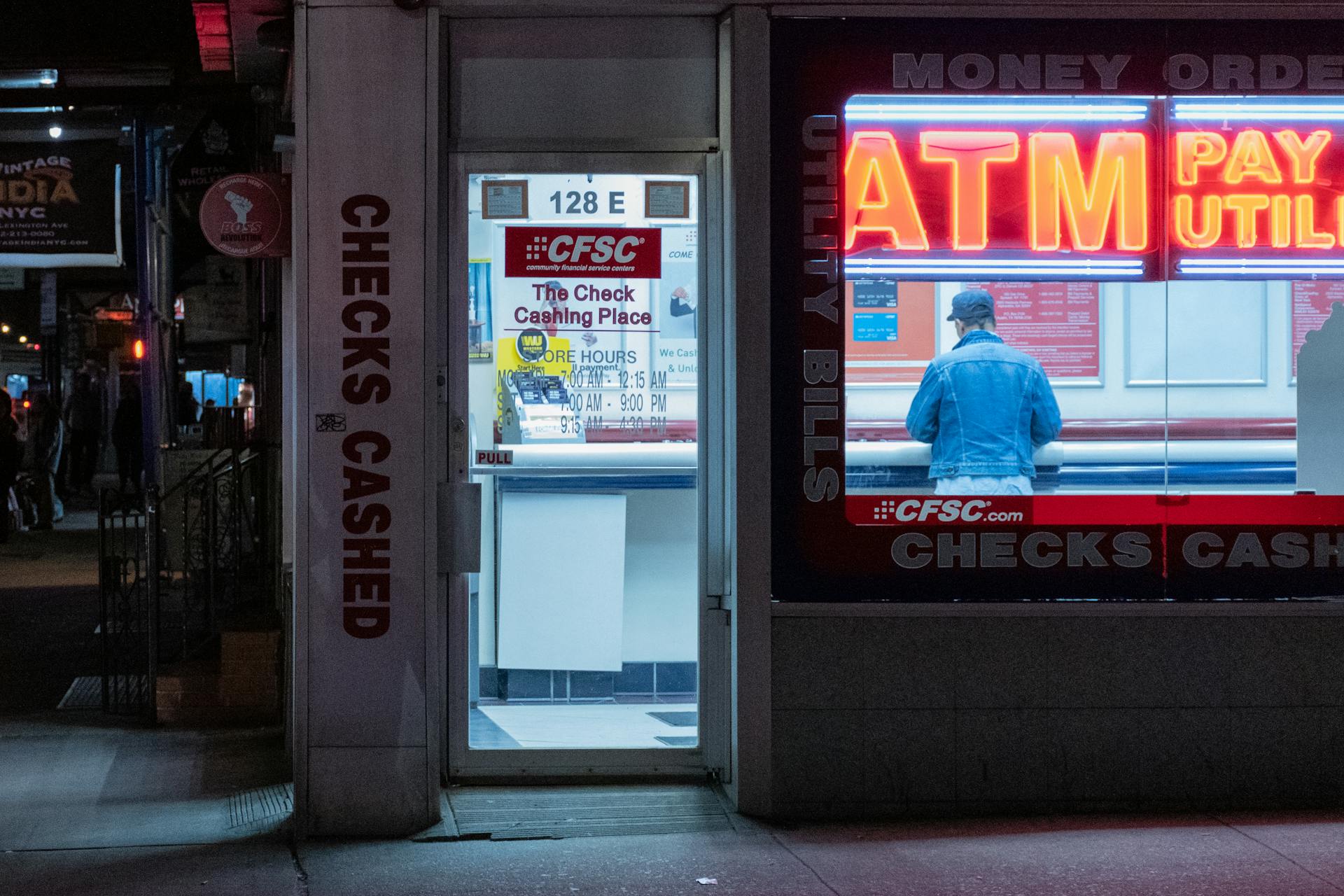
Merchant cash advances can be a lifeline for businesses with bad credit, but it's essential to understand how they work and what alternatives are available.
Merchant cash advances are a type of financing that allows businesses to receive a lump sum of cash in exchange for a percentage of their daily credit card sales.
For businesses with bad credit, a merchant cash advance can be a more accessible option than traditional loans.
However, it's crucial to note that merchant cash advances often come with high interest rates and fees, which can be difficult to pay back.
A typical merchant cash advance agreement can range from 100% to 400% APR, making it essential to carefully review the terms before signing.
Businesses with bad credit may also want to explore alternative funding options, such as invoice financing or peer-to-peer lending.
If this caught your attention, see: Peer to Peer Lending Advantages and Disadvantages
What is a Merchant Cash Advance?
A merchant cash advance is a type of financing that provides you with money right away in exchange for a percentage of your debit and credit card sales.
It's not a traditional loan, and the payment process works differently. Lenders calculate a total based on your daily credit/debit card sales and offer you a sum for a future percentage of these totals.
The contract is indefinite and only completes when you repay the total amount to the lender. This can take a long time, depending on how well your business is doing.
The portion you pay back is significantly higher than the amount you borrow, which is a key aspect of merchant cash advances.
Funding Options for Bad Credit
Merchant cash advances (MCAs) are a viable funding option for businesses with bad credit. MCA providers focus on your business's revenue rather than your credit score for eligibility, making it an option for businesses with a steady cash flow but may have encountered credit challenges in the past.
This type of funding is particularly useful for businesses that need fast funding and have strong revenue but limited credit. MCAs come with a flexible repayment structure by deducting a percentage of future credit card sales, which means that repayment adjusts based on the performance of the business.
Worth a look: How to Get a Small Business Loan without Collateral
Factor rates often result in higher borrowing costs, so businesses need a solid plan to use the advance effectively and to handle the repayment terms. Factor rates range from 1.1 to 1.5, and if you receive a $20,000 advance with a factor rate of 1.2, you'll repay $24,000 in total.
Businesses with bad credit may be charged higher factor rates, which can lead to high repayment costs. To mitigate this, look for MCA providers that specialize in working with businesses with bad credit and offer clear terms and reasonable rates.
Here are some MCA providers that cater to businesses with bad credit:
- LVRG Business Funding
- Other specialized MCA providers
It's essential to calculate the total repayment amount to determine if the MCA is feasible given your business's cash flow. Consider whether your industry has seasonal fluctuations, as lower revenue periods might make the MCA harder to manage. Evaluating both the cost and repayment period of the MCA will help you make an informed decision.
Understanding MCA Funding
Merchant cash advances (MCAs) can be a viable option for businesses with bad credit. MCAs are not loans, but rather a sale of future sales for an upfront lump sum of working capital.
MCAs don't have fixed monthly payments or require perfect credit, making them a potentially great option for some small business owners. The application process involves evaluating your business's daily sales, credit card transactions, debit card transactions, bank statements, and accounts receivables.
The repayment structure is flexible, with a percentage of future credit card sales deducted daily. If your sales are high, you'll repay more that day, and if sales dip, the payment amount also decreases.
MCAs come with factor fees, which can range from 1.1 to 1.5. For example, if you receive a $20,000 advance with a factor rate of 1.2, you'll repay $24,000 in total.
Here's a summary of the benefits and drawbacks of MCAs:
When to Get an Advance?
You're considering taking the leap with MCA funding, and wondering when to get an advance. A good rule of thumb is to get an advance when your business is generating consistent cash flow, typically after 3-6 months of operations.
This allows you to tap into the equity you've built up in your business and use it to fuel growth or cover unexpected expenses.
If you're a seasonal business, it's best to get an advance during your slow period, when cash flow is typically lower. This ensures you have a steady influx of funds to bridge the gap until your busy season kicks in.
A well-timed advance can be a game-changer for your business, but it's essential to have a solid plan in place for repayment.
Intriguing read: Money Lender Business Loan
MCA Funding Basics
Merchant cash advances (MCAs) are a type of financing that allows businesses to sell their future sales for an upfront lump sum of working capital.
MCAs don't have fixed monthly payments or require perfect credit, making them a potentially great option for some small business owners.
The application process involves evaluating your business's daily sales, credit card transactions, debit card transactions, bank statements, and accounts receivables.
Factor fees are the costs associated with MCAs, and they can range from 1.1 to 1.5, depending on the provider.
For example, if you receive a $20,000 advance with a factor rate of 1.2, you'll repay $24,000 in total.
MCAs are repaid by deducting a percentage of future credit card sales, which means that repayment adjusts based on the performance of the business.
If your sales are high, you'll repay more that day, and if sales dip, the payment amount also decreases.
Since MCAs aren't loans, there are no interest rates, but factor fees can result in higher borrowing costs.
Businesses need a solid plan to use the advance effectively and to handle the repayment terms.
MCAs can be a practical short-term solution for businesses that need fast funding and have strong revenue but limited credit.
Here are some key facts to keep in mind:
Alternatives to Merchant Cash Advances
If you're struggling to get approved for a traditional loan, consider using collateral or adding a cosigner to your business loan to improve your chances. This can be a good option if you have time to plan for your financing.
Traditional loans may come with higher interest rates and shorter terms, but they're often a more affordable and better long-term option than merchant cash advances. You may also want to explore online business loans, which can overlook barriers such as length of time in business, personal credit score, or revenue requirements.
If you have friends or family members who are willing and able to loan you money for your business, it may be a good idea to seek their help before turning to an MCA. Be sure to establish clear written terms of any agreement to avoid personal disputes.
Here are some alternatives to merchant cash advances:
- Traditional loans with collateral or a cosigner
- Online business loans
- Friends and family loans
Use a Term Loan
Term loans can be a great alternative to Merchant Cash Advances. They offer more generous interest rates, which can save you money in the long run.
You can use a term loan to consolidate your debts, making it easier to manage your finances. This is especially helpful if your MCA has an increasing interest rate for late payments.
Term loans can take a while to process, but many online lenders offer quick turnaround times, minimizing the extra interest you'll accrue. This can be a huge relief when you're trying to get back on your feet financially.
If you're struggling to pay off your MCA, a term loan can help you pay it off and start fresh. This can be a game-changer for businesses that are barely staying afloat.
Explore further: Short Term Rental Loan
Switch to Invoice Factoring
Invoice factoring is a great alternative to Merchant Cash Advances (MCAs) that can help you get the money you need quickly. It's not a loan, which means you won't have to worry about accumulating more debt.
You can use invoice factoring if you have a lot of pending invoices or business transactions on the way. This can be a lifesaver if you're struggling to make ends meet.
Invoice factoring works by selling your outstanding invoices to a factoring company for a lump sum of money, usually less than the actual invoices are worth. This can be a good option if you need cash fast.
Just be careful not to sell too many invoices, or you might end up with a business that can't function.
Best Advances
If you're considering a merchant cash advance, you may want to explore other options first. Credibly is a good choice for businesses that need flexible funding.
For established businesses, Libertas Funding is a viable option. They offer a more traditional approach to merchant cash advances.
If you're not sure which option is best for you, Lendio can help you compare your options. This can save you time and effort in the long run.
Don't let bad credit hold you back - Fora Financial is a good choice for businesses with less-than-perfect credit.
Readers also liked: Good Faith Loan
Managing MCA Debt
Managing MCA Debt can be a challenge, but there are ways to make it more manageable. You can renegotiate the debt by offering a lower immediate payment, which might be more appealing to the lender than facing a lengthy collection process.
Factor fees can be a significant concern, with rates ranging from 1.1 to 1.5, meaning you'll repay more than the initial advance. For example, a $20,000 advance with a factor rate of 1.2 would result in a total repayment of $24,000.
If you're struggling to repay, you can try extending the payment period by contacting your lender and asking for an extension, but be aware that they may want more money for this restructuring.
If this caught your attention, see: What Is a Private Money Lender
Renegotiate the Debt
Merchant cash advances aren't legally obligated loans, so you might have some leverage when it comes time for the company to collect.
The collection process can be tiresome and time-consuming for both the lender and borrower, which could give you an opportunity to negotiate a lower immediate payment.
Keep in mind the type of contract you signed with the lender, as they often include a "confession of judgment" clause that removes your ability to defend yourself in court.
Don't assume the lender will be unwilling to negotiate, as they may be willing to accept a lower payment to avoid the hassle of legal action.
In fact, most MCA providers want you to pay back the cash advance as quickly as possible, so they may be open to negotiating a payment plan.
If this caught your attention, see: Private Money Lender List
Final Thoughts
It's essential to know the terms and costs of a Merchant Cash Advance (MCA) before applying, as this will help you understand the potential impact on your cash flow.
Funding can be obtained within a few days, but it's crucial to weigh the benefits against the potential costs.
Be sure to carefully consider whether an MCA is the right fit for your business, taking into account your financial situation and goals.
Invoice factoring can be a great financing option for small business funding, but it's not suitable for everyone.
If this caught your attention, see: Premium Capital Funding
Sources
- https://www.biz2credit.com/merchant-cash-advance/business-cash-advance-with-bad-credit
- https://www.cnbc.com/select/best-merchant-cash-advances/
- https://www.nerdwallet.com/article/small-business/merchant-cash-advance
- https://altline.sobanco.com/how-to-get-out-of-a-merchant-cash-advance/
- https://www.lvrgllc.com/high-risk-merchant-cash-advance
Featured Images: pexels.com


